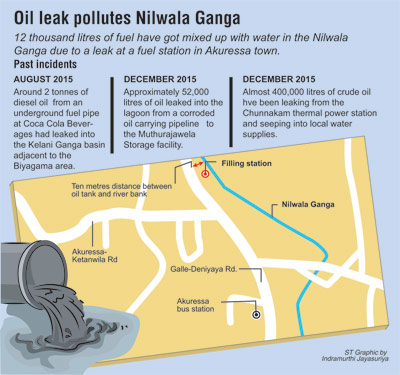News
New oil spill shows CPC keeps on ‘repeating mistakes’

About 12,000 litres of diesel from a storage tank is believed to have leaked into the Nilwala Ganga at Akuressa
In the third major oil leak in five months harming the environment, about 12,000 litres of diesel fuel from a storage tank is believed to have leaked into the Nilwala Ganga at Akuressa.
The Ceylon Petrol Corporation (CPC) failed to check if the fuel depot that had the faulty tank had taken basic steps to prevent such a leak, Central Environmental Authority (CEA) Deputy Director in Matara, Susantha Wedage, said.
Mr. Wedage pointed out that, in recent weeks, petrol had leaked from CPC pipes into the Muthurajawela marsh and that last August fuel had been accidentally released from a private factory into the Kelani River.
The most recent leak was from an underground metal tank dating from the 1960s. “The CPC should have upgraded the system and installed tanks under guidelines and checked their tanks properly as well as issued protocols on how to limit leakage from their tanks,” Mr. Wedage said.
“We sealed the petrol depot until further action is taken by us” he said, adding that the CEA would call in experts to carry out more investigation and analysis of the impact of the oil leak into the river. Mr. Wedage said most of the leaked oil had been cleaned up.
A coastguard official at the site said workers at the petrol depot had informed the service that the diesel tank had 17,000 litres of fuel on Friday night but that at 8 a.m. the following day they had noticed only a count of 7,000 litres.
“They had put the rest of the oil into barrels but during that time 2,000 litres more had seeped into the soil and leaked into the water through the bank of the Nilwala Ganga which is not far from the petrol depot,” he said.

He said cleanup workers had used floating booms around the oil leakage point and at the water intake stations at Kathuwa and Balakawa in Akuressa, 2-20km downstream.
“Three water-pumping stations of the Water Supply and Drainage Board halted pumping for a day while the Coastguard Oil Response Team cleaned up the oil using absorbents,” he said.
He said modern petrol depots used concrete tanks to avoid leakages but that regrettably only a few new petrol stations had them.
The National Water Supply and Drainage Board General Manager, K. Balasuriya, said the oil leak was “no major threat and is under control”. He said – but at least one environmental group disagrees – that small quantities of diesel were still present in the water after four days of cleanup operations but not, he claimed, at harmful levels.
“A small amount of diesel is non-harmful. Complete cleaning is impossible,” he said.
He said the booms had prevented the diesel going into water intake pipes on the river bed and that the filtration tanks of the water purifying plant had not been affected by oil.
As a precaution the water plant had suspended normal pumping operations for six hours and households affected by the cutoff had been provided with water from bowsers.
The Marine Environment Protection Authority (MEPA) said it would sue the CPC if “one drop of diesel” goes into the sea. MEPA General Manager Dr. Terney Kumara said the CPC kept repeating its mistakes.
“Earlier there was an oil leak at Muthurajawela where a petroleum pipeline became damaged after being filled with seawater. Now it is a petrol station with a diesel leak. The Petroleum Corporation should have protective methods to stop oil from leaking,” he said.
Dr. Kumara said it was being argued that the petrol depot from which the leak emanated was very old. But if it was old the corporation should repair its systems or change to concrete tanks, he said.
An official working at the CPC Head Office in Colombo who requested anonymity said the authorities had approved a proposal to create concrete tanks underneath the depot in question and place the existing metal tanks in them.

The petrol depot is closed until further action is taken, a CEA official said
He said the concept is carried out at some new petrol depots and that after the leak the authorities had decided to implement the procedure at the Akuressa depot and other depots near water bodies.
The official said the leak could have resulted from the metal of the tank rusting in the soil in which it was placed. He said the depot had been closed until concrete tanks were installed and the oil products stored there had been shifted to Kolonnawa.
The Chairman of the Biodiversity Conservation and Research Circle, Supun Prakash, said the Water Board could not assert that a small percentage of diesel in water was not harmful.
“Diesel is a contaminant and a petroleum product that has benzene and toluene, chemicals that are not supposed to be in water according to World Health Organisation standards,” he said.
Benzene could increase blood-related diseases as well as help develop cancers while toluene could cause kidney and nerve ailments. Mr. Prakash said water contamination should not be taken lightly as endangered the lives of all living things.

